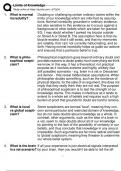Limits of Knowledge
Study online at https://quizlet.com/_d72a34
1. What is normal Doubting or challenging certain ordinary claims within the
incredulity? limits of our knowledge which are informed by assump-
tions. Normal incredulity grounded in ordinary evidence,
but also sensitive to this evidence as it occurs against a
background of other beliefs which are taken for granted.
EG, I may doubt whether I parked my bicycle outside
on Street A or Street B. The assumption here is that my
bicycle existed, that it still exists, and that my memories
are reliable, that I am not currently hallucinating, and so
forth. Having normal incredulity helps us guide our actions
and ensures that a particular belief is true.
2. What is philo- Philosophical scepticism goes beyond ordinary doubt and
sophical scepti- provides reasons to doubt pretty much everything we think
cism? we know. In this way, it has a theoretical, not practical
purpose as it involves extreme and highly unlikely (but
still possible) scenarios - e.g. brain in a vat or Descartes'
evil demon - that reveal hidden/basic assumptions. When
philosopher doubts something, such as the existence of
physical objects, for the sake of an argument, this does not
imply that they really think they are not real. The purpose
of philosophical scepticism is to test the strength of our
knowledge claims. This makes it infectious as it tends to
extend to a whole set of beliefs and requires such a high
burden of proof that grounds for doubt are hard to remove.
3. What is local Some scepticisms are termed 'local', meaning they con-
vs global scepti- cern some particular and restricted domain of knowledge,
cism? but do not raise doubts about knowledge as a whole. In
contrast, other arguments, such as the idea of a brain in
a vat, seem to raise doubts about all of our knowledge
by pointing to the lack of the possibility of certainty in our
beliefs, and thus conclude that knowledge in any area is
impossible. Such arguments are far more radical and lead
to 'global' scepticism, meaning they threaten to undermine
our whole belief system.
4. What is the brain If all your experience is just electrical signals interpreted
in a vat scenario? by your brain, then you wouldn't be able to tell the dif-
1/8
, Limits of Knowledge
Study online at https://quizlet.com/_d72a34
ference if you were a disembodied brain in a vat being
fed these same electrical signals artificially. So, in this
scenario, you might believe the statement "I'm outside
walking my dog." but in reality you are just a disembodied
brain in a vat being made to feel as if you are outside
walking your dog. Hence, your belief would be false. Any
global scepticism scenario like this shows that everything
you believe could be false and there would be no way
of knowing. Global scepticism undermines all our usual
justifications for belief.
5. what does the The infinite regress argument suggests that none of our
infinite regress beliefs are justified as any premise we have to support
argument sug- anything can be questioned and thus the whole of our
gest? belief system rests on nothing. If I justify a belief by appeal
to a further belief, then this further belief must itself be
worthy of assent, meaning it will also have to be known.
However, we will always be able to question any further
beliefs and so the process if producing evidence to justify
one's beliefs can have no end. So any claim to knowledge
is caught in a vicious infinite regress: there seems to be
no way of providing a complete justification for our beliefs.
But if our beliefs cannot be justified, knowledge must be
impossible to come by, so we seem forced to draw the
sceptical conclusion that we cannot know anything.
6. What is foun- In order to stop infinite regress, we can search for
dationalism and 'regress-ending' beliefs. These beliefs, which are other-
how is it a re- wise known as foundational truths, can be accepted as
sponse to the in- knowable without the need for further justification as the
finite regress ar- simply justify themselves. Both rationalists and empiricists
gument? are committed to the existence of foundational beliefs
which are the basic beliefs on top of which all other beliefs
are built. However, they approach foundationalism as a
whole differently.
7. What is the dif- Rationalists search for beliefs which can be known a priori
ference between simply through the application of reason and treat these
how rationalists as the self-justifying basis for all knowledge. believe there
2/8





